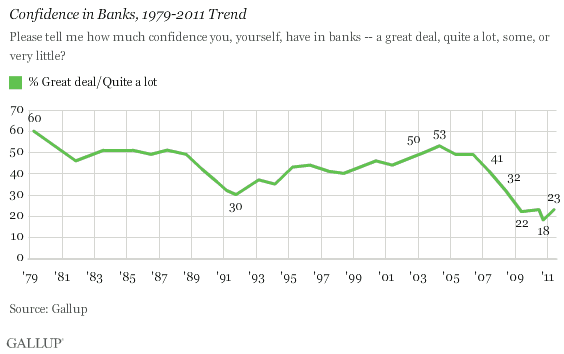

Throughout the ages, the institution of a bank underwent a lengthy and (seemingly never concluded) evolution, which brought it from its original roots to the form known to us presently, i.e. great, multinational corporations. Nowadays it is difficult to imagine the world without banking and banks, as they play an important and irreplaceable role in the financial aspect of the lives of most people of the civilised world. However, some analysts say, that now – probably for the first time in history – the future of the bank is not unthreatened.

Wykres Instytutu Gallupa obrazujący poziom zaufania do banków w Stanach Zjednoczonych Ameryki na przestrzeni lat 1979 – 2011, źródło: https://news.gallup.com/businessjournal/148049/rebuilding-trust-banks.aspx
Nowadays banks face a systemic challenge from the so-called FinTechs, which have developed thanks to the great advancements in science and technology made in recent years. The term FinTech, which is an abbreviation from the words ‘financial technology’ is defined as a ‘new financial industry that applies technology to improve financial activities. ’ and used to describe a broad and diverse range of technology aiming at competition with traditional methods of providing financial services (most of these traditional methods are embodied in the activities of the banks). Examples of FinTech solutions include banking services based on artificial intelligence, the technology of blockchain, big data and robotic process automation.
These solutions are often fostered by international technological corporations acting on a global scale, referred to as BigTechs – large technology conglomerates with extensive customer networks with core businesses in social media, telecommunications, internet search and e-commerce. Contemporarily, the influence of both – FinTech solutions and BigTech actors – is constantly increasing. For these innovative endeavours, the rapid technological progress being made in areas such as big data, artificial intelligence and machine learning is increasingly being seen as an opportunity for development, which can potentially bring about a revolution in the financial sector. However, while technological and FinTech companies thrive on this development which they perceive as a great opportunity, the ‘traditional’ banks have grounds to be less enthusiastic, as the institution of the bank is not guaranteed to survive these revolutionary changes.
Banks do not enjoy high social trust , and to make things worse, they are burdened by the memories of the – relatively recent – crisis of 2008-2009. However, meanwhile technology advancements began to replace institutional trust, providing internet companies with a great opportunity to penetrate the financial services market. A good example of such dynamic is the situation of Paypal (an American multinational financial technology company operating an online payments system), which took advantage of the potential to offer payment services at a cheaper cost and with greater speed. Banks struggled to compete since they were still dealing with the aftermath of the financial crisis.
What should banks do in order to remain relevant players of the financial sector and to retain their influence? The answer seems to be to adapt to the technological revolution which has taken place, and not to neglect the fact that the world of finance of today has changed greatly. Some banks (such as J. P. Morgan ) have decided to acquire FinTech companies in order to improve and modernise their efficiency and methods of banking. Other banks have decided to make investments in FinTechs through venture capital investments – this appears to be a strategy adapted by multiple banks, such as Goldman Sachs, J. P. Morgan, Citi and Capital One. Another way of adaptation can be to cooperate through entering into strategic partnerships with BigTechs dealing with financial services – this can be exemplified by the partnership of Goldman Sachs and Apple aimed at creating the innovative Apple Card.
If the banking sector does not open itself for innovation, its influence – which was historically always assured – will soon face serious threats and can visibly diminish. However, if the banks prove to be sufficiently prudent, they will try to work out solutions based on a mutually rewarding coexistence with the FinTech sector and they will survive, also benefiting from its success. It remains for the banks to hope that they will find ways to cooperate and coexist in this new, forever-changed reality of the financial sector.
Obrazek wyróżniający: Image by Freepik
- The pitfalls of climate & energy policy in the 21st century
- Światowa Organizacja Zdrowia – zastrzeżenia w kontekście aktualnych projektów legislacyjnych
- Dokąd zmierza Europa? Czy planowane zmiany traktatowe to koniec tego, co zostało z suwerenności państw członkowskich Unii Europejskiej?
- Inwestowanie w Fundusze ESG
- A proposal for a EU-wide shared heritage promotion programme
- Raportowanie niefinansowe ESG – część 2
- Nowy Fundusz Inicjatyw Obywatelskich – NoweFIO